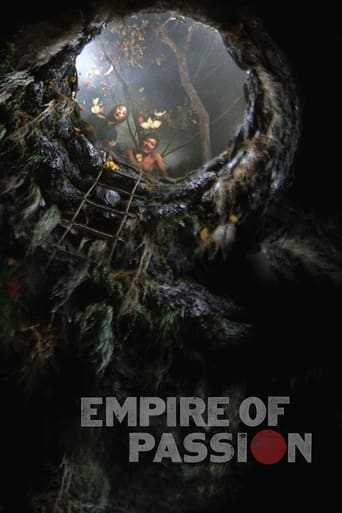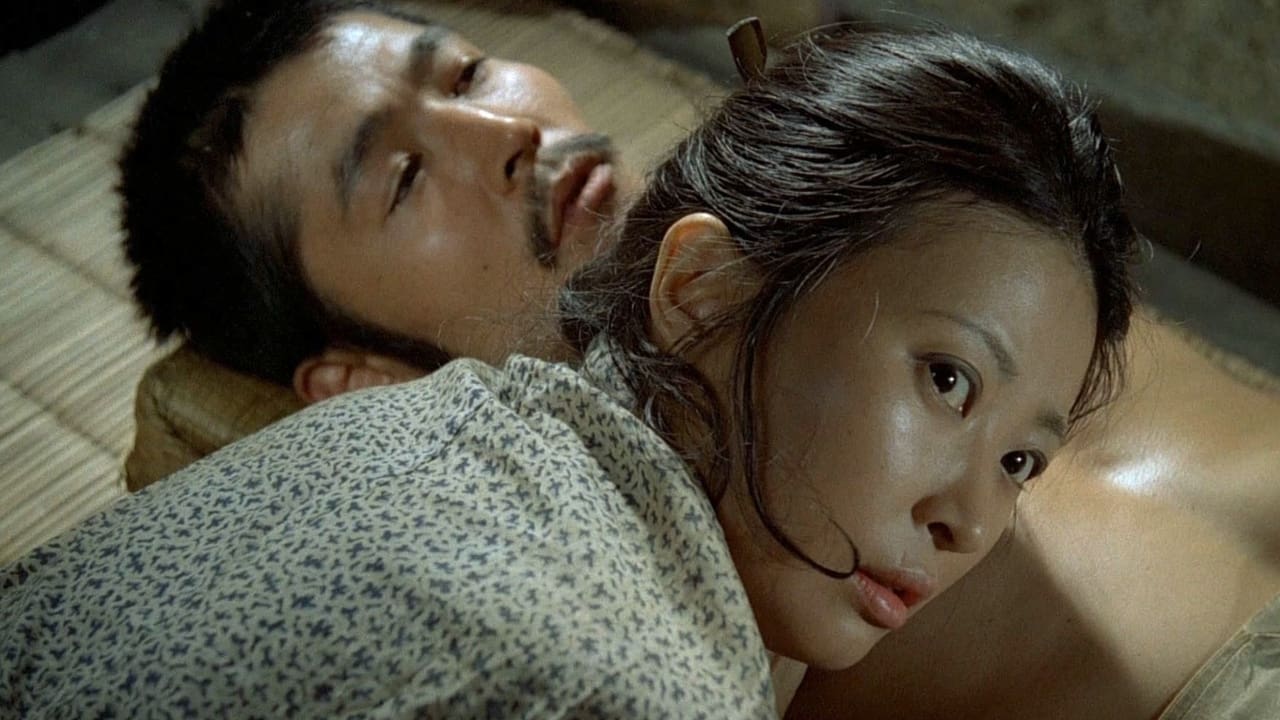m-sendey
A young man called Toyoji (Tatsuya Fuji) has an affair with a married woman, Seki (Kazuko Yoshiyuki), who is twenty years older than him. Nonetheless he isn't preoccupied with it. Toyoji gets increasingly jealous of her husband, thus one day, when her husband is out, Toyoji shaves her pubic hair, upon having sex with Seki. Thereafter, she is agreeable to assist him in killing her husband, not wanting her consort to see her being shaved. They succeed, notwithstanding, after some time, bizarre phenomena begin to transpire
Empire of Passion (1978) aka Ai no borei has a potential that is sadly wasted. The film of Nagisa Oshima, the director of controversial In the Realm of the Senses (1976) and Merry Christmas Mr. Lawrence (1983), is a mishmash of stronger and weaker ideas. Despite having an interesting concept, which merges erotica as well as kaidan-eiga genre, and a good production design, the flick never manages to be particularly memorable and on the whole it appears very uneven. To start with, the beginning seems very rushed and mauled, scenes rapidly skip from one to another, giving it a rather undisciplined appearance and a textural balance is upended. The character of Seki's husband lacks depth, thus a viewer fails to get acquainted with him and feel pity for him, when he is actually killed. After Seki's consort demise, the pace swiftly slows down and the action drags. At this point, the problematic editing is even more visible, since the content consists of some good scenes as well as totally unnecessary ones and Oshima doesn't fully succeed in focusing on more significant moments, polishing them to perfection. The oneiric parts are neatly handled, nevertheless they don't make a viewer's blood curdle since the tension never becomes overwhelming and there is no real climax of terror. Unfortunately, the movie doesn't send chills down one's spine. The psychological aspect of the two key characters and their carnal obsession remains undeveloped and ineffectively explored. The emotional background which forces Toyoji and Seki to slaughter her husband is rather lame just like the ending which is also executed in an uninspired way which renders the flick even more distant and the story which is intended to be spicy isn't sufficiently sensual. Mise en scène is flawed throughout the whole movie and the paltry writing punctuates it. Notwithstanding, it isn't without its merits. Cinematography by Yoshio Miyajima is tremendous and gives this film a bleak zest and the lighting is pure visual poetry. Sets and costumes look realistic. Peasants' shacks and long grasses swaying in the wind all shrouded in the mist are ravishingly portentous.Two actors playing Toyoji and Seki i.e. Tatsuya Fuji and Kazuko Yoshiyuki give satisfying performances. There is a fine chemistry between them and their emotions are well exposed. It isn't anything exquisite though and there isn't too much to gloat over since the acting still isn't anything remarkable.The soundtrack by Toru Takemitsu is absolutely staggering and it is a true work of art that is probably the best aspect of the entire movie. It adds traditional Japanese atmosphere to the movie and folk flutes, which are frequently exploited, stun in their own, ghoulish way. This decidedly belongs to one of the composer's best creations.It may be stated that it is a bewildering and delightful flick. Notwithstanding, the amazing framing and aesthetic beauty cannot replace the true cinematic value and outshine its multiple flaws. The erratic pace, the ineffective storytelling and writing result in creating an uneven ensemble. It isn't a bad film though – it has a great deal of neatly crafted sequences, some interesting visuals and above all it implicates the phenomenal soundtrack. This simply isn't flabbergasting in terms of high quality. If one is capable of overlooking its numerous shortcomings, it is going to be a decent pastime, however, nothing more than that.
ebiros2
I'm not sure if I qualify for commenting on this movie. I'm on and off impressed with director Nagisa Ooshima's movies. I'm not from the generation when he was at the zenith of his career, and I can't comment on how much of a shock value his movies had in the '60s and '70s.The movie is beautiful. One thing I can say about director Ooshima is the perfection of beauty of his visuals.The story seems rather prosaic now after 35 years since it was made. It's a simple story about a murder based on an affair. How unusual is that ? I was counting on Ooshima's sharpness at making a point from his unique perspective as a director, and a story teller. I couldn't find that here, and is my point of disappointment.The movie is rather ordinary Japanese movie from the '70s. It's got stunningly beautiful visuals compared to movies other directors made around the same period (see for instance "Inugami no Tatari" that takes place in a similar setting and you'll see how great Nagisa Ooshima's visual presentation is), but the story and the acting is rather average. I also couldn't feel the outstanding "speed" that I usually feel when watching his better movies.So I'm only commenting from the 21st century perspective on this movie, and may not at all be fair to the movie or the director. But it's a good movie that's mildly interesting to watch, with absolutely first class cinematography. You would have to see this yourself, and be the judge of its value.
GyatsoLa
A genuinely creepy ghost story, full of chills and sensuality, this movie just falls short of what it promises. It is apparently based on an old ghost story, and perhaps relies a little too much on a simple premise. For most of the way, its imaginative and genuinely gripping, but at the end its almost like Oshima just lost interest in it, and brought it to a rapid ending.The story is simple - a woman and her younger lover kill her husband so that they can be together. But their failure of nerve and his returning ghost condemn them to madness. Its beautifully handled, with imaginative set scenes, and the lovers passion is portrayed beautifully. But too often the movie fails to really deliver on its promise, almost as if Oshima loses his nerve in the same way the lovers do.Its a worthwhile movie to watch just to see how Oshima combines his great skill as a film maker with some exploitation movie tricks to pull the audience along, but sadly its not a true classic in the mold of movies like Onibaba or Woman of the Dunes.
valadas
Eros and Thanatos, Love and Death command the dialectics of Life. By the end of 19th century in a remote Japanese village a young man and a married woman, older than he, fall in love with each other and decide to kill her husband to be free to enjoy their love. But they never enjoy that freedom since Remorse begins to haunt them beginning as usual at the time by the weakest member of the couple, the woman of course. Henceforth in an atmosphere where dream (nightmare) mixes up with reality the ghost of the murdered husband appears first to the woman but then also to the man. It also haunts the dreams of the other villagers creating a climate of suspicion and gossip around the couple which is aggravated by the arrival of a police officer that comes to investigate the disappearance of the murdered husband. But which makes this movie more interesting besides this almost common story of adultery is the evolution of the couple's feelings in a Shakespearean deep psychological and dramatic development of remorse, anguish and fear which turns their love relationship into a nightmare until their final doom. The expressionism so dear to Japanese theatre or movie acting is also present in the players' performances but not in an exaggerated form. Just only in the necessary measure to show more effectively the most deep feelings of the depicted characters. This is indeed a solid good movie.


 AD
AD




